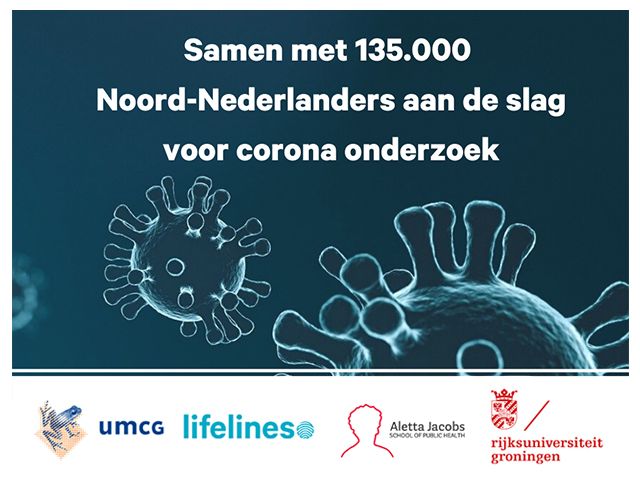Groot onderzoek in Noord-Nederland naar risicofactoren voor coronavirus

English translation below
Deze week start in Noord-Nederland een grootschalig onderzoek naar de risicofactoren voor het nieuwe coronavirus, SARS-CoV-2. Ruim 135.000 noorderlingen krijgen hiervoor de komende tijd wekelijks een vragenlijst toegestuurd. Hun antwoorden worden gekoppeld aan data van biobank Lifelines om zowel erfelijke als omgevingsfactoren op te sporen die mede bepalen of iemand ernstig ziek wordt van het coronavirus of juist milde klachten ontwikkelt.
Genetisch bepaald?
De wekelijkse vragenlijsten worden verstuurd naar deelnemers van de onderzoeksprogramma’s Lifelines en NEXT. Hun antwoorden worden gecombineerd met eerder verzamelde data, waaronder ook genetische informatie. Hoofdonderzoeker prof. dr. Lude Franke, Hoogleraar Genetica licht toe: “Met dit onderzoek willen we zien of er verschillen in het DNA te vinden zijn tussen mensen die ernstig ziek zijn geworden door het coronavirus en mensen die milde symptomen hebben gehad.”
Invloed op mentale gezondheid
Tevens wordt met dit onderzoek onderzocht in hoeverre het coronavirus invloed heeft op het welzijn en welbevinden van de noorderlingen. Worden mensen somber of angstig? Heeft dit effect op hun eetgedrag en gezondheid? Hoe raakt het hun dagelijkse leven, waaronder het werk? En wat voor effecten gaat dit op de langere termijn hebben?
Verspreiding in kaart
Dankzij dit onderzoek wordt ook in kaart gebracht hoe de verspreiding van het coronavirus over de komende maanden in de drie noordelijke provincies verloopt. Deze kennis kan helpen om in de toekomst bij andere infectieziekten nauwkeuriger te kunnen voorspellen wat er zal gebeuren.
Noord-Nederland bundelt haar krachten
Het Lifelines corona-onderzoek is een gezamenlijk initiatief van het UMCG, Rijksuniversiteit Groningen, Aletta Jacobs School of Public Health en Lifelines. Het wordt mede mogelijk gemaakt door de Universiteit van het Noorden, een collectief van noordelijke kennisinstellingen. Lifelines-bestuurder Bert-Jan Souman: "Het is bijzonder om te zien wat we gezamenlijk op zo’n korte termijn hebben georganiseerd. We bundelen onze krachten om de kennis over het coronavirus te vergroten en met wetenschappelijk onderzoek bij te dragen aan onze maatschappij.”
Deelname voor Lifelines-deelnemers
Alleen deelnemers aan de onderzoeksprogramma’s Lifelines en Lifelines NEXT worden uitgenodigd voor dit onderzoek. Ze ontvangen de uitnodiging per e-mail. Meer informatie is te vinden op www.lifelines.nl.
Major research in the Northern Netherlands into risk factors for coronavirus
This week, large-scale research into the risk factors for the coronavirus COVID-19 is being started in the Northern Netherlands. To this end, around 135,000 Northern residents will receive a weekly questionnaire in the coming period. Their answers will be linked to data from the Lifelines biobank to identify both hereditary and environmental factors that partially determine whether someone may fall seriously ill due to the coronavirus or simply develop mild symptoms.
Genetically determined?
The weekly questionnaire will be sent to participants of the Lifelines and NEXT research programmes. Their answers will be combined with previously gathered data, including genetic information. Head researcher Lude Franke, Professor of Genetics, explains: “With this research, we want to see whether there are differences between the DNA of people who have fallen seriously ill due to the coronavirus and people who have experienced mild symptoms.”
Influence on mental health
Furthermore, the extent to which the coronavirus influences Northern residents’ wellbeing will also be researched in this study. Is it making people feel gloomy or anxious? How is this affecting their dietary behaviour and health? How has this influenced their daily lives, including work? And what effects will this have in the longer term?
Mapping the spread
Thanks to this research, the spreading of the coronavirus across the three Northern provinces over the next few months will be mapped. This knowledge may help to more accurately predict what may happen in cases of infectious diseases or viruses in the future.
Northern Netherlands joins forces
The Lifelines coronavirus study is a joint initiative of the University Medical Center Groningen, the University of Groningen, the Aletta Jacobs School of Public Health and the Lifelines biobank. It was partly made possible by the University of the North, a collective of Northern knowledge institutions. Lifelines director Bert-Jan Souman: “It is extraordinary to see what we have organized together at such short notice. We are joining forces to broaden our knowledge on the coronavirus and to contribute to society through scientific research.”
Contributions by Lifelines participants
Only participants of the Lifelines and Lifelines NEXT research programmes are invited to contribute to this study. They will receive an email invitation to this end. More information can be found at www.lifelines.nl/covid19.



